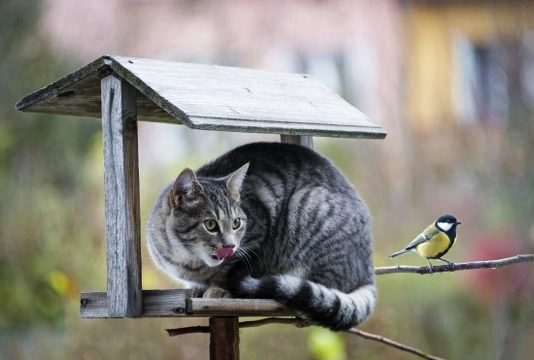
Protecting wild birds from hunting cats
Hunting is a natural feline behaviour, and every cat possesses the hunting instinct to some extent, although some cats are more interested in hunting than others! While many cats will bag themselves a mouse, rat or other small ground-dwelling furry from time to time, birds, however, are in a league of their own, and present much more of a challenge to the hunting cat. Cats are much less likely to be able to snare themselves a bird than they are a creature that does not take flight, but nevertheless, some cats are adept hunters of prey on the wing, and may catch and kill a reasonable amount of wild birds over the course of their lives.
If your cat is prone to hunting birds and achieves even a moderate degree of success, it is a good idea to take what steps you can to keep the local bird population safe, as some of our native bird species are becoming increasingly rare. Particularly if you like to feed wild birds in your garden, keeping them safe from your cat can be a challenge. However, there are a few ways that you can try to prevent your cat from catching unwary birds, by following a few simple steps.
Early warning signals for birds
If your cat is stealthy and patient, they may sit in wait for a tasty avian snack for some time, staying almost perfectly still and pouncing when their prey is within reach. Attaching a bell to your cat’s collar is one really simple method of ensuring that when your cat moves, they give off an audible signal to nearby birds, which can help to save their lives!
Ground-level birds
Birds that feed from the ground, such as the Robin for instance, are particularly likely to fall prey to a hunting cat. Cats sit in wait for their prey, often hiding themselves in bushes and other ground cover, so try to avoid having hedges and bushes growing out of control, and prune down the lower branches. If you place food out for ground-feeding birds, try to ensure it is at least fifteen feet away from any bushes or growth that your cat may use for camouflage.
Off-the-ground feeders
Try to place bird feeders at least a metre above ground level, and the higher the better. Unlike ground-level feeding, try to place food offered above the ground near to some trees or cover, as a feeding station that is too exposed can attract predators from the air, such as Sparrowhawks, which will pick off smaller birds. A lot of the birdfeeder devices that are designed to deter squirrels and make it harder for squirrels to get to the food will also prove effective at keeping your cat down, such as placing a barrier on the pole of feeders and tables to keep cats and squirrels from climbing the pole.
Don’t create a cat buffet!
If you concentrate all of your bird feeding endeavours, such as a table and various types of hanging food in one spot, this will of course lead to a greater concentration of birds in the one area, making it easy pickings for your cat. Try to spread food out to various locations around the garden, so that birds stand a better chance of keeping clear of your cat’s advances and are not swept up in a flurry of feeding.
Discouraging your cat from using bird-friendly areas of the garden
While you are unlikely to be 100% effective at keeping your cat away from one particular area of the garden without fencing it off, there are steps that you can take to discourage your cat from getting comfortable in areas that the birds also like.
A scented oil such as citronella will often deter cats, but avoid using sonic cat repellents or any other products that work to repel your cat by causing them discomfort or exposure to an unpleasant sound.
Nesting birds
The time of year when birds are nesting and chicks are hatching is one of the most vulnerable for birds, and fledglings and baby birds that fall from their nests make for easy pickings for your cat. While there is very little that you can do to help a chick that falls to ground level and is caught by your cat, you can take some steps to help to protect nests and nesting boxes and ensure that your cat cannot easily climb up to them. Spiky bushes and vegetation with thorns such as hawthorn or blackthorn planted out around nesting areas can help to ensure that your cat is not overly keen to play in the bushes, or to climb the branches, helping to protect the integrity of nesting birds and fledglings.
If you find that your cat still terrorises the bird population when they are nesting, you might find that restricting your cat’s access to the garden at certain times of the day is the best way to minimise their hunting.



